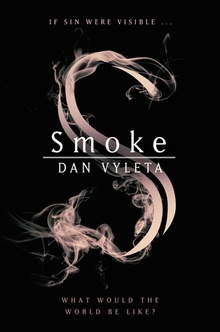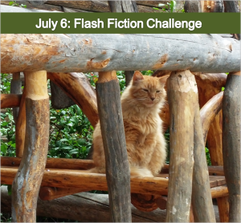| Mother says that I am obsessed; that far from dismissing Smoke, I have made it my idol. Indeed I am grateful for the Smoke. It tells us when we err. Imagine a world in which we err and nobody notices. Not even oneself. Until one goes to seed by increments and slides into the madness of villainy. Smoke eats our reason with a charcoal spoon. We measure our humanity against its darkness. It is good it leaves a mark. |
Not a promising beginning to this reader, although the exquisite prose was more than sufficient to contain my reservations about the school setting and the initially ephemeral, although intriguing, concept of Smoke. But like the two friends, I was about to have my horizons widened by a novel that combines a pacey adventure with fundamental philosophical and psychological questions about the management of negative forces at both the individual and societal level.
As the devil was for the early Christians, so is Smoke to the citizens of this alternative Victorian England. Feared, despised, yet horrifyingly compelling, the ruling class has sought to banish Smoke to the commoners, especially in the stink and dirt of London. Education consists largely of fostering religiosity and self-control in order to perpetuate the system which separates rich from poor, godly from ungodly, peaceful from violent and mad from sane. But times are changing. As the boys forge minds of their own through the discovery of multiple cracks in the system, so too do new ideas and inventions from liberal thinkers and from Europe (as if Dan Vyleta could have anticipated England’s fear-driven vote to withdraw) threaten the status quo. Thomas and Charlie will find, as did Dawnay, the fictional foremother of Darwin, that a rational mind is not necessarily a blessing in such times.
With the point of view changing from one (short) chapter to the next, the pace never drags as, again and again, we turn a corner and a new perspective opens up. It’s a classic hero’s journey yet we don’t discover, until the end, what the destination will be. Despite the grimy subject matter, I found this a life-affirming novel about embracing our humanity in both its light and dark sides.
Dan Vyleta’s fictional dystopia contains echoes for me of Never Let Me Go, Goodhouse and The Chimes, each of which create an alternative society to reflect our own. Like The Gustav Sonata, Smoke questions the veneration of self-mastery, particularly for young children, and, like Regeneration, the cruelties sometimes perpetrated on the vulnerable in the name of treatment. Like Time of the Beast, the novel is also a very clear illustration of the psychoanalytic processes of splitting and projection of the unwelcome aspects of our personalities onto others and the fragile and paranoid social systems that these collective defences create. (See this article by Susie Orbach on the psychoanalytic interpretation of Britain’s recent own goal that has led to an unusual political rant here on Annecdotal.) Thanks to Weidenfeld & Nicolson for my advance proof copy.
| How to link Smoke to a flash fiction prompt about cats in a way that will make sense to those who don’t read this review? Although a cat serves as confidante to the main character in my debut novel, Sugar and Snails, and I wrote about cats in a post on moving house, our feline friends don’t often occupy my thoughts. But I’ve had a go: |
Aleptic did not stir as the mouse scampered across the hearth rug.
“See!” said Renshaw. “Even a cat has more self-control than you have.”
Thomas’s anger tasted acrid, but he swallowed it down. He’d have to manage his base instincts, or he’d never leave school.
The teacher returned to his marking. Thomas forced his attention towards his essay. The essentials of self-mastery. Why did the topic elude him so much?
A fearsome yowl. Teacher and pupil raised their heads from their desks. The mouse captive in Aleptic’s paws.
Thomas took up his pen. I resolve to emulate a cat.























 RSS Feed
RSS Feed





















